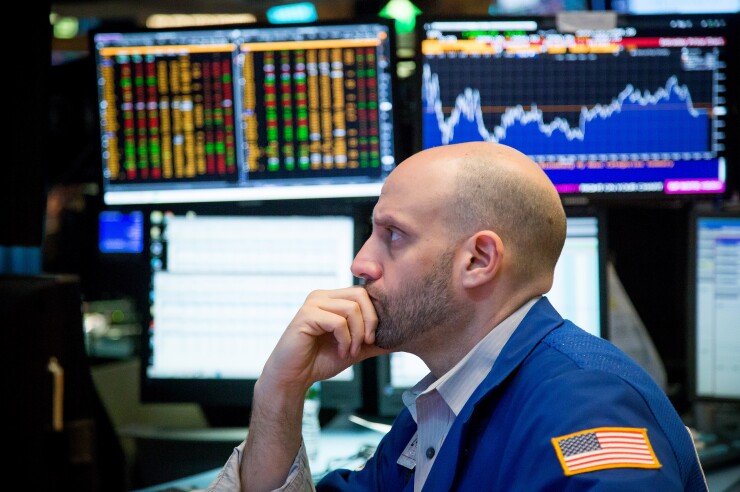This article has been updated to include recent stock moves.
U.S. bank stocks wobbled Monday as part of a global shakedown that tanked Japanese markets, slammed tech stocks and raised questions over the Federal Reserve's interest rate policy stance.
Share prices slid but recovered from their intraday lows, with Citigroup recently down 2.8%, Wells Fargo down 2.1%, and JPMorgan Chase down 1.9%. The KRE exchange-traded fund, which tracks regional bank performance, lost 2.6%.
At Bank of America, whose stock legendary investor Warren Buffett has been offloading, shares fell 1.9% to $36.88. Buffett's Berkshire Hathaway has also sold roughly half of its holdings in the tech giant Apple, amassing a large cash position and raising worries that a top investor is headed for the exits.
Tech stocks were hard hit in the U.S. sell-off, signaling more investor skepticism over a coming boom in artificial intelligence. Japanese stocks suffered their worst day since 1987, with the Nikkei stock index crashing 12.4%.
Analysts partly blamed the rout on the so-called unwinding of the yen carry trade, where investors borrow money in cheap yen, convert it to U.S. dollars and sink that cash into tech stocks and other investments. The Japanese central bank, which has long kept interest rates ultra-low, made the math on the trade more complicated after raising interest rates and making the yen more expensive.
The turmoil also followed Friday's release of the latest U.S. jobs report, which showed a relatively small increase of 114,000 jobs in July and a bump-up in the unemployment rate to 4.3%.
Bank stocks had fallen after the job's report release over fears that the economy is faltering, putting pressure on banks' borrowers.
The soft jobs report fueled bets that the Federal Reserve may be forced to slash interest rates to sustain the economy — a view that picked up steam after Monday's market turmoil.
The economy's resilience had raised hopes that the U.S. economy could withstand higher interest rates and avoid a recession.
"But with the unemployment rate up 0.5% over four months it looks increasingly likely that the downturn was simply delayed," Citigroup economist Andrew Hollenhorst wrote in a note to clients, adding that the risks are "skewed toward deeper and faster cuts" in interest rates.
An emergency rate cut ahead of the Fed's next regularly scheduled meeting in mid-September "is possible if the risk sell-off continues," Hollenhorst wrote, though he added that scenario remains unlikely.
In
"The Fed's job is very straightforward, maximize employment, stabilize prices and maintain financial stability. That's what we're going to do," the central bank official said during an interview on CNBC's "Squawk Box" program. "We're forward-looking about it. So if the conditions collectively start coming in like that on the through line, there's deterioration on any of those parts, we're going to fix it."
The yield on the benchmark 10-year U.S. Treasury yield has fallen sharply in recent days, as bets on Fed rate cuts and worries over the economy percolate. The benchmark 10-year Treasury yield was hovering around 3.7% on Monday, down from over 4% late last month.
"Investor sentiment has shifted decidedly in favor of economic angst over optimism," Ian Lyngen, an interest rate analyst at BMO Capital Markets, wrote in a note to clients.
The widespread market sell-off on Monday is a "complicating factor" for the Fed's rate-setting Federal Open Market Committee, he added.
"The magnitude of the current selloff hasn't risen to the level at which one should anticipate the FOMC would need to offer a policy response," Lyngen wrote. "In the event the selloff is just beginning, there is, of course, a downside level for stocks at which the Fed would consider an intermeeting cut."






